
Personalism is an intellectual stance that emphasizes the importance of human persons. Personalism exists in many different versions, and this makes it somewhat difficult to define as a philosophical and theological movement. Friedrich Schleiermacher first used the term personalism in print in 1799. One can trace the concept back to earlier thinkers in various parts of the world.
Jorge Ángel Livraga Rizzi was an Argentine poet, novelist, self-taught philosopher, essayist, educator and lecturer of Italian heritage best known for having founded and directed New Acropolis, an international philosophical educational and cultural organisation.
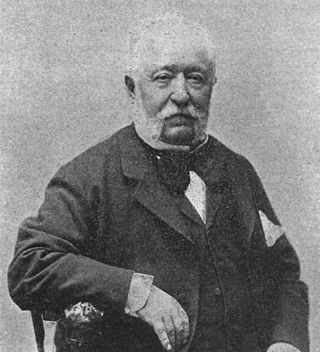
Ramón María de las Mercedes Pérez de Campoamor y Campoosorio, known as Ramón de Campoamor, was a Spanish realist poet and philosopher.
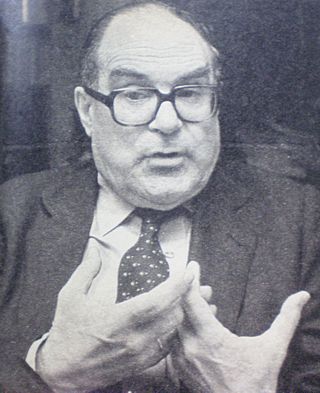
Julián Marías Aguilera was a Spanish philosopher associated with the Generation of '36 movement. He was a pupil of the Spanish philosopher José Ortega y Gasset and member of the Madrid School.

Philosophical anthropology, sometimes called anthropological philosophy, is a discipline dealing with questions of metaphysics and phenomenology of the human person.
Fernando Ramón Martínez Heredia was a prominent Cuban revolutionary thinker and politician. Martínez was a founding member of the Cuban Communist Party, and as a member of the July 26 Movement, he took part in the Revolution which overthrow the Batista dictatorship.

Antonio Millán-Puelles was a Spanish philosopher interested in phenomenology and metaphysics, who published many books and articles. He discovered his vocation to philosophy when he read Husserl’s Logical Investigations and abandoned the medical studies he had just begun.
José Luis Osvaldo Lira Pérez SS.CC. was a Chilean priest, philosopher and theologian who wrote more than 10 books on topics related to the philosophy of St. Thomas Aquinas, as well as Ortega y Gasset and Juan Vázquez de Mella. He devoted most of his life to teaching in different universities, and had as many followers as opponents.
Carlos Castrodeza Ruíz de la Cuesta was a Spanish biologist and philosopher. He taught philosophy of science at Madrid's Complutense University.

Jesús Mosterín was a leading Spanish philosopher and a thinker of broad spectrum, often at the frontier between science and philosophy.
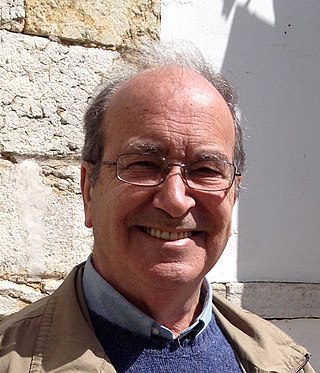
Juan Manuel Rodríguez López is a Spanish-born, naturalized Ecuadorian author and professor. He holds a licenciate/BA degree in philosophy and a doctorate in literature from Pontificia Universidad Católica del Ecuador (PUCE). He was a professor at Universidad Central del Ecuador and Universidad Católica, as well as a founding professor of Universidad San Francisco de Quito, where he was Dean of the College of Communication and Contemporary Arts.
Jesús Ballesteros is a Spanish philosopher and jurist.

Emilio Lledó Íñigo is a Spanish philosopher. He has been a professor at several universities and is a member of the Royal Spanish Academy.
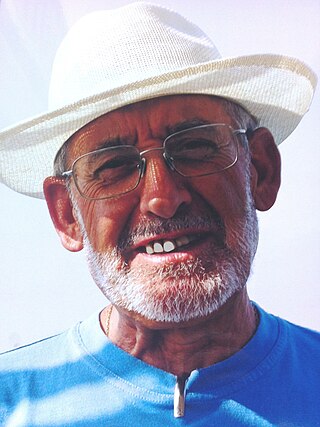
Manuel Sánchez Cuesta is philosopher, ethicist and humanist.
Antonio Colinas Lobato is a Spanish writer and intellectual who was born in La Bañeza, León, Spain on January 30, 1946. He has published a variety of works, but is considered to be above all a poet. He won Spain's National Prize for Literature in 1982, among several other honors and awards.

Integrism was a Spanish political philosophy of the late 19th and early 20th century. Rooted in ultraconservative Catholic groupings like Neo-Catholics or Carlists, the Integrists represented the most right-wing formation of the Restoration political spectrum. Their vision discarded religious tolerance and embraced a state constructed along strictly Catholic lines; the Integrists opposed Liberalism and parliamentarian system, advocating an accidentalist organic regime. Led first by Ramón Nocedal Romea and then by Juan Olazábal Ramery they were active as a political structure named Partido Católico Nacional, but the group retained influence mostly thanks to an array of periodicals, headed by the Madrid-based El Siglo Futuro. Though Integrism enjoyed some momentum when it formally emerged in the late 1880s, it was soon reduced to a third-rate political force and eventually amalgamated within Carlism in the early 1930s.

Follow the Legion is a 1942 Spanish drama film directed by Juan de Orduña and starring Alfredo Mayo, Luis Peña and Manuel Luna.
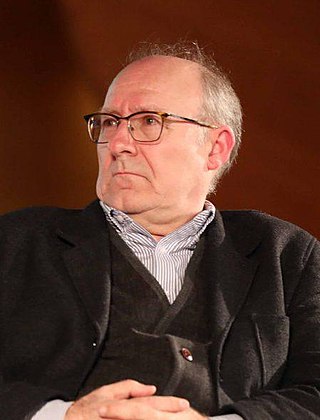
José Luis Villacañas Berlanga is a Spanish political philosopher and historian of political ideas.

The Heraldo de Madrid was a Spanish daily newspaper published from 1890 to 1939, with an evening circulation. It came to espouse a Republican leaning in its later spell.

José Miguel Gambra Gutiérrez is a Spanish philosopher and politician. He is known mostly as the expert in logic and in the theory of predicates; since the 1980s he has been holding various teaching positions at Facultad de Filosofía of Universidad Complutense in Madrid. He is also recognized as a theorist of political and social science; Gambra advances the Traditionalist vision of state and society. In politics he adheres to the Carlist cause. In 2010-2021 he was leading one of two Traditionalist organisations in Spain, Comunión Tradicionalista.












